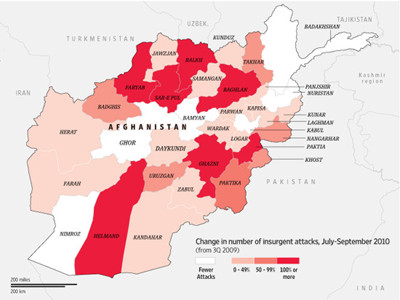By ABDUL LATIF SAHAK
MAZAR-E SHARIF, Afghanistan -- Until recently, bus driver Ustad Toryalai said that there were plenty of passengers looking to travel between Kabul and Mazar-e-Sharif in northern Afghanistan. His vehicle was crowded day and night with casual travelers, businessmen and international aid workers shuttling between the two major cities.

The Taliban have ramped up attacks in once-peaceful northern Afghan provinces, even as they are battling the U.S.-led military surge in the south and east. See how the number of attacks by armed opposition groups has changed in each province of Afghanistan.
See interactive graphic here
But over the last six months, Toryalai said, traffic has declined dramatically, with passengers refusing to travel at night and even hesitant to make the trip during daylight hours because of the possibility of attacks by the Taliban.
"I used to make $1,500 (a month), but that's now fallen to half that amount because people only like to travel during in the daytime, and they don't carry commercial goods with them," he said.
"The police patrol the highways during the day, but at night it's either the Taliban or else hijackers passing themselves off as Taliban," he said.
Security officials say an increasing number of insurgents, under attack by NATO-led forces in the south, are infiltrating the north, where they find a number of eager recruits anxious to be employed by Taliban fighters.
"The insurgents have come under pressure in the southern provinces, so they have turned to the north," said Daud Daud, commander of an Afghan National Police unit that's responsible for security in the north and northeast of the country.
Daud said the situation was critical in Kunduz, Takhar, Baghlan, Balkh, Jowzjan and Faryab provinces.
Over the last month, Daud said, Afghan army forces and police have suffered more than 30 casualties. Dozens of civilians and aid workers have also been injured.
In a recent speech, Atta Mohammad Nur, the governor of Balkh province, complained that insurgent activity has spread to the Mazar-e-Sharif, a major city in the north, despite the presence of 120,000 Afghan troops, 6,000 Americans and 5,000 German troops.
He complained that the local police were under manned, badly equipped and failed to receive necessary support from the national army.
"Police numbers are low at village and district levels, and they have poorer-quality weapons than the Taliban," he said. "The records for northern provinces show that there's just one policeman for every one or two villages, whereas it's likely there are dozens of Taliban in some of these villages." Despite the increase in violence, Nur said he opposed increasing the number of foreign forces in the province, fearing they would only lead to increased insurgent activity.
Residents of other northern provinces share similar complaints.
Ibrahim, a merchant who trades oil in the northwestern Faryab province and lives in Andkhoy district on the border with Turkmenistan, said the Taliban operate unhindered in the area and were recruiting many local young men.
"A few nights ago, the Taliban took me out of a car and questioned me," he said. "As soon as I told them I'm a businessman, they released me."
Abdul Haq Shafaq, the governor of Faryab province, acknowledged that the insurgents are active in most districts of the province.
Faryab police chief, Brig. Gen. Abdul Khalil Andarabi, said that his men were critically short of resources, and urgently needed assistance from the Afghan interior ministry.
"We're short of police and we are making serious efforts to integrate the 'arbakai' (locally raised militia) into the province's police framework," he said. "The interior ministry needs to increase the number of police we have here; it's a pressing concern." And Afghan government forces and coalition forces could be facing an even more complex set of enemies in the north.
Gen. Fail Mohammad, who is in charge of implementing the Afghan government's National Development Strategy in the north, said that in addition to Afghan Taliban, there are also members of the Pakistani Taliban and the Islamic Movement of Uzbekistan, or IMU, operating in the area.
The IMU originated in Central Asia in the 1990s, but relocated to Afghanistan and Pakistan and has become a close ally of the Taliban. Over the past year, the group, made up primarily of ethnic Uzbeks, has been infiltrating fighters into northern Afghanistan, where they carry out attacks with the predominantly ethnic Pashtun Taliban.
ABOUT THE WRITER
Abdul Latif Sahak is a reporter in Afghanistan who writes for The Institute for War & Peace Reporting, a nonprofit organization that trains journalists in areas of conflict. Readers may write to the author at the Institute for War & Peace Reporting, 48 Grays Inn Road, London WC1X 8LT, U.K.; Web site: www.iwpr.net. For information about IWPR's funding, please go to http://www.iwpr.net/index.pl?top-supporters.html.



